Cairo Time Blu-ray Movie
HomeCairo Time Blu-ray Movie 
MPI Media Group | 2009 | 90 min | Rated PG | Nov 30, 2010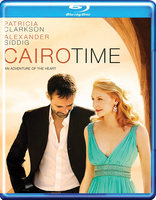
Movie rating
7.1 | / 10 |
Blu-ray rating
| Users | 0.0 | |
| Reviewer | 4.5 | |
| Overall | 4.5 |
Overview
Cairo Time (2009)
A woman arrives in Cairo to meet her husband only to be told he is unavoidably delayed in Gaza and has in turn sent his friend, a retired Egyptian U.N. security officer, to meet her at the airport. The brief love affair that follows catches them both completely off guard.
Starring: Patricia Clarkson, Alexander Siddig, Elena Anaya, Tom McCamus, Amina AnnabiDirector: Ruba Nadda
| Romance | Uncertain |
| Drama | Uncertain |
Specifications
Video
Video codec: MPEG-4 AVC
Video resolution: 1080p
Aspect ratio: 2.35:1
Original aspect ratio: 2.39:1
Audio
English: DTS-HD Master Audio 5.1
English: LPCM 2.0
Subtitles
English SDH, Spanish
Discs
25GB Blu-ray Disc
Single disc (1 BD)
Playback
Region A (B, C untested)
Review
Rating summary
| Movie | 4.0 | |
| Video | 4.5 | |
| Audio | 4.5 | |
| Extras | 4.0 | |
| Overall | 4.5 |
Cairo Time Blu-ray Movie Review
Not So Brief Encounter
Reviewed by Michael Reuben December 29, 2011Since the recent "Arab Spring", mentioning Cairo is most likely to evoke images of protesters gathering in Tahrir Square. But Cairo is a venerable city, built on ancient foundations composed of countless layers of human endeavor laid down by generations long past. When Canadian filmmaker Ruba Nadda first visited Cairo with her Arabic parents, who had emigrated to Canada before she was born, the city spoke to her at such a visceral level that she remained determined to make a film there through many years of difficulties logistical, bureaucratic and financial. But it would not be a film about history or politics. It would be a simple human story told from the perspective of an outsider, which Nadda is, even though she's of Arabic descent and speaks the language. It would capture the mystery of Cairo without attempting to explain it. Indeed, that very mystery would be part of a magical experience shared by people whose daily lives were otherwise normal and routine. Cairo Time is a small story told on a huge canvas, with the pyramids looming in the background, the River Nile flowing by, and an active cityscape churning around the two characters at the heart of the story. The film was shot entirely on location, and director Nadda seems endlessly amused when asked (as she frequently is) about her "green screen" effects—of which there are none in the movie. Those really are the views of the Nile from the hotel balcony where the film's heroine stays (and the cast and crew stayed as well). That really is how Cairo appears from the taxis and private autos in which the characters ride (and into which Nadda and her cameraman squeezed to get the shots). And those aren't extras milling about in the streets or seated at the tables in coffee houses; they're citizens of Cairo who just happened to be there that day and, in many instances, were persuaded to play along with a film crew by a petite Arabic-speaking woman from Canada who also happened to be a director determined to get her shot. Probably because it was a native creation, Cairo Time received a Blu-ray release in Canada almost a year before the U.S. The Canadian release from Mongrel Media was reviewed here by Dr. Svet Atanasov. The U.S. version is noteworthy for adding a lossless DTS soundtrack and more extras, which means, at the very least, that this disc from MPI Media Group (for IFC Films) has been reauthored. (Since I do not have the Mongrel Media disc for comparison, I cannot say whether the same transfer has been used.)
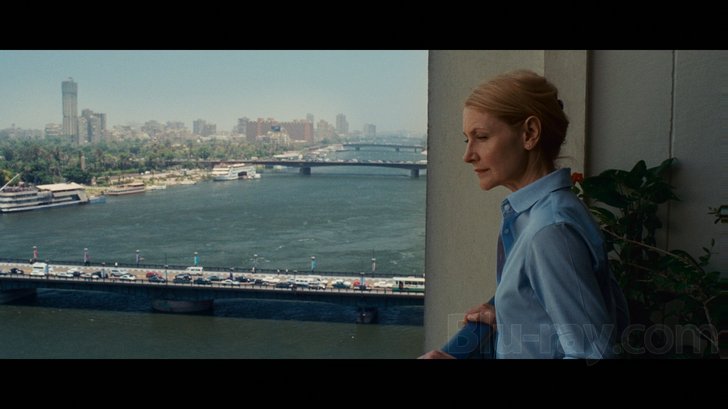
This isn't green screen.
Juliette Grant (Patricia Clarkson) arrives in Cairo to meet her husband of many years, Mark, who works with the United Nations overseeing a refugee camp in Gaza. A mother whose children are grown—her daughter has graduated college and her son is on his honeymoon (she feels like he doesn't "belong to me anymore")—Juliette fills her time writing for a fluffy woman's magazine called Vous. As will become clear during the course of the film, she is at loose ends in her life and has obviously been looking forward to this opportunity to spend time with her husband. But when Juliette disembarks from her flight, Mark isn't there to meet her. He has been delayed indefinitely by some sort of regional flare-up, and he has sent a recently retired colleague, Tareq (Alexander Siddig), to convey Juliette to her hotel. Since Mark has told each one much about the other, they are not complete strangers. Their meeting is formal but not awkward. As Juliette and Tareq leave the airport, however, an event occurs that slightly breaches the wall of formality between them. A woman from Tareq's past, Yasmeen (Amina Annabi), calls out a greeting. They have not seen each other for years. Yasmeen is in Cairo with her daughter, Hanan (Fadia Nadda, the director's sister), who is soon to be married. As Juliette looks on with obvious interest at Tareq's barely concealed unease, Yasmeen tells him that she is now a widow and that she still remembers him. Then she invites him to the wedding. On the ride to her hotel, Juliette is too polite to be overly inquisitive, but both she and Tareq know she's seen something unexpectedly personal. As the delay in Mark's arrival stretches on for days, Juliette finds time weighing heavily. Her efforts to be a tourist are hampered by the aggressive swarms of young man who congregate almost menacingly around an unescorted woman in the street (and a blonde one at that). An embassy luncheon where she finds herself surrounded by what Juliette calls "petroleum wives" can only fill up an afternoon. A visit to the White Desert with a fellow strandee named Kathryn (Elena Anaya), whose boyfriend also works for the U.N., provides a break in the routine, but there's only so much comfort Juliette can take from someone who, like her, is merely idling away the hours. Juliette derives much greater enjoyment from visiting the coffee bar that Tareq has taken over from his father, where he readily abandons his chess board to accompany her in the streets of the Cairo. Their relationship grows by fits and starts, but it is a relationship, and they both know it, even as Juliette continues to implore her husband on the phone to please, please conclude his business in Gaza and join her. In an impulsive and ill-considered move, she even boards a bus bound for Gaza, only to have it stopped by armed soldiers for reasons never explained. Juliette's Canadian passport and diplomatic connection separate her from the other passengers and allow her to call someone to return her to Cairo. She calls Tareq, whose dark looks of concern (or anger) convey the former security officer's knowledge of how foolishly Juliette has behaved. The incident provides the pair another opportunity for shared adventure, though. One of the bus passengers pressed a letter into Juliette's hand as the soldiers approached, and against his better judgment, Tareq helps her deliver it. The effort leads them to a sweatshop where expensive rugs are made by child labor. The experience prompts yet another of the many cross-cultural conversations in which Juliette and Tareq explore each other. (The factory location was real and so were the children; in the commentary, director Nadda relates how the owner didn't want them filming his pre-teen workers, but the crew fooled him by pretending to use one camera, while in fact the other was running). The relationship that develops between Juliette and Tareq is deep and emotionally intense, but I hesitate to call it an "affair". These are not impetuous or desperate people swept away in a careless moment. They're deliberate, thoughtful and mature individuals from entirely different worlds, each of whom knows who they are. The excitement of their shared experience comes from their seeing each other the way Juliette sees Cairo: for the first time, even though it's been there for years, as if waiting for her to see it. If Cairo were a living thing, it might look back at her the way Tareq does. The film's title has multiple meanings. At the most literal, it refers to the time Juliette spends in Cairo (although she does leave for a day to accompany Tareq to the wedding of Yasmeen's daughter). It also refers to a more leisurely pace of life enjoyed in that part of the world by people like Tareq, though not by the girls who make rugs—distinctions and differences that Juliette and Tareq debate in a delicately nuanced scene that is less about politics than about exchanges of life experiences. And the title could also refer to a special time and place, separated from normal life, in which two souls make a unique contact for a short interval, which they know can't last.
Cairo Time Blu-ray Movie, Video Quality 
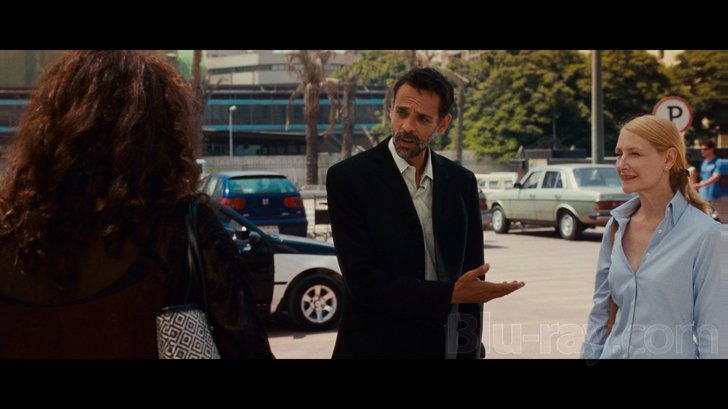
Cinematographer Luc Montpellier's colorful, detailed photography of Cairo and its environs sparkles on MPI's 1080p, AVC-encoded Blu-ray of Cairo Time, which shows the city in all its hot and dusty glory. Black levels are solid, contrast is appropriate, colors are rich and varied, and detail is excellent throughout, even in scenes of scorching heat. (The production shot primarily in early morning and late afternoon to avoid the worst extremes of temperature and sunlight.) On my 72" screen, I saw only an occasional hint of video noise and nothing to indicate any high frequency filtering, artificial sharpening or compression issues. As with nearly all contemporary productions, the film was finished on a digital intermediate, which effectively eliminates any print-related defects.
Cairo Time Blu-ray Movie, Audio Quality 
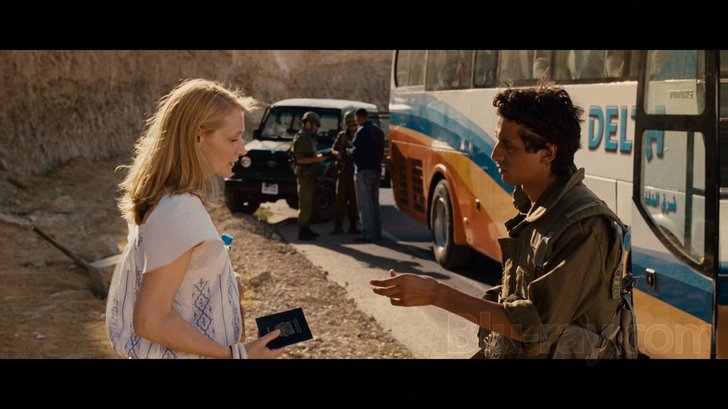
Where the chief criticism of the Mongrel Media disc was the absence of a lossless audio track and subtitles, the MPI disc offers a lossless audio track in DTS-HD MA 5.1, along with English SDH and Spanish subtitles. Cairo Time has an active and immersive sound mix that is evident from the very opening of the film when Patricia Clarkson's Juliette steps into the Cairo airport and is immediately hit with a barrage of local sound that surrounds both her and the listener. This effect prevails throughout the film, especially when the characters are outside on the streets of the city. The soundtrack is constantly reminding you of the presence of a busy metropolis, complete with traffic, car horns, voices and other distance noises to your left and right. Tareq's coffee bar and the wedding of Yasmeen's daughter also provide interesting opportunities for immersive sound effects. The counterpoint to this aggressive use of effects is the achingly romantic score by Irish composer Niall Byrne. It sounds beautiful on the lossless track, as does the Arabic music that frequently plays as source music and that Juliette comes to love.
Cairo Time Blu-ray Movie, Special Features and Extras 
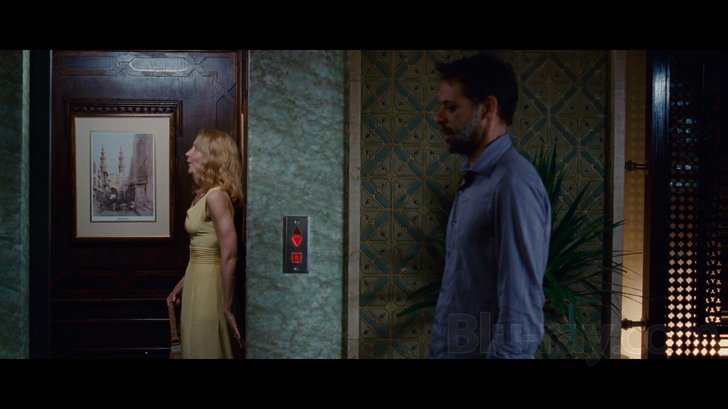
Extras marked with an asterisk are new to this edition.
- Commentary with Writer-Director Ruba Nadda and Cinematographer Luc Montpellier: This appears to be the same commentary included on the disc previously released by Mongrel Media. Nadda and Montpellier speak continuously throughout the film's running time, often prompting each other's memories with details about the shoot and its many challenges. Nadda is unstinting in her praise for her two leads' ability to adapt to difficult circumstances and for their contributions to defining the characters and, in Siddig's case, contributing material to the script.
- Making of Featurette (SD; 1.78:1, enhanced; 7:35): The bulk of the featurette consists of Nadda sitting on her sofa being interviewed. The clips are intercut with scenes from the film. Toward the end, there are brief excerpts from the Toronto Bookstore Q&A described below. Nadda hits most of the key points of writing, casting and shooting the film. She also includes some additional colorful details, such as the deeply religious neighborhood that government officials warned her to avoid, but she took her crew there anyway. The experience was rewarding, educational and utterly safe.
- Toronto Bookstore Q&A (SD; 1.85:1, non-enhanced; 25:58): Taped on Sept. 14, 2009, just after the film's premiere at the Toronto Film Festival, a panel consisting of Nadda, Clarkson, Siddig and an overly talkative moderator discuss the film before an appreciative audience.
- *Deleted Scenes (3:15): It should be "scene" singular, but it's an interesting one that would have changed the tone (though not the events) of the ending.
- *Short Films (SD; 1.33:1)
- Laila (5:15)
- Slut (4:18)
- Do Nothing (4:00)
- Aadan (8:14)
- Trailer (HD; 2.35:1; 1:57): Effective (and also accurate).
- *Additional Trailers: At startup the disc plays trailers, in standard definition, for Life in Flight, Don't Look Back, Let It Rain, Joan Rivers: A Piece of Work; and Heartbreaker. These can be skipped with the chapter forward button but are not otherwise available once the disc loads.
Cairo Time Blu-ray Movie, Overall Score and Recommendation 
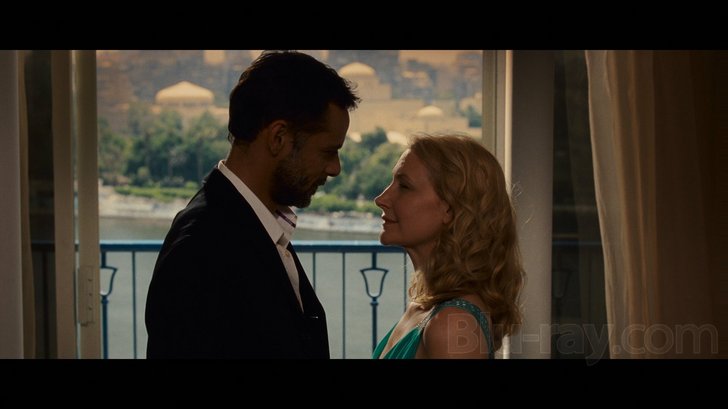
Cairo Time is deliberate, even languorous, in its pacing, and it sometimes has the very hypnotic effect that being deposited in a hot, arid foreign city for an indefinite stay would be likely to induce in most Westerners. But that very effect is an essential element of the film, because it somehow deepens the impression left by the small gestures, the looks exchanged, and the pregnant silences between two characters (and two actors) who can convey volumes without talking too much. Director Nadda has enough confidence in her script, her locale and her two leads to let their story unfold at its own leisurely pace, rather than try to pump "energy" into it with frantic cutting and "script doctoring" to "punch up" dialogue that needed no further explanation. Juliette and Tareq linger in the memory precisely because their encounters have not been muddied by such contemporary studio techniques. Both the film and the disc are highly recommended.
Similar titles
Similar titles you might also like

Café Society
2016

God's Own Country
2017

Third Person
2013

Now, Voyager
1942

A Letter to Three Wives
Fox Studio Classics
1949

Beloved Infidel
Limited Edition to 3000 - SOLD OUT
1959

The Way We Were 4K
50th Anniversary
1973

Not Easily Broken
2009

Anna Christie
Warner Archive Collection / Includes German-Language Alternate Version
1930

White Woman
1933

Brooklyn
2015

Imitation of Life
1934

Vanity Fair
2004

Monster's Ball
2001

Little Man, What Now?
1934

Wuthering Heights
1970

Wuthering Heights
2009

Last Night
2010

Redeeming Love
2022

One Day
2011